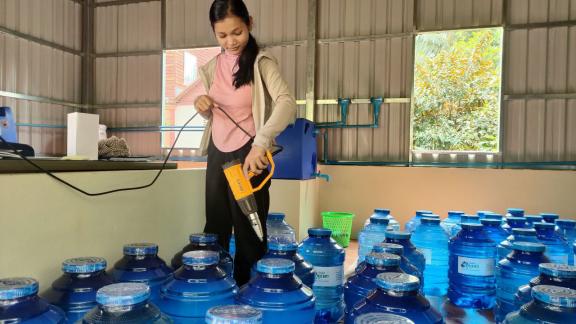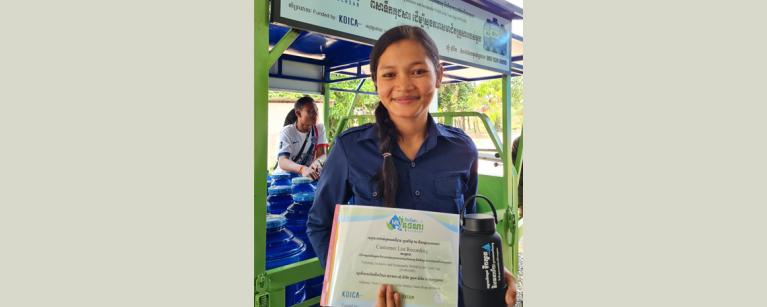In Varin village, where access to safe drinking water was once a daily challenge, a young woman named Sreyneak is leading a remarkable transformation. At just 24 years old, she is not only improving the health of her community but also challeng traditional gender norms.
Growing up in a village where many families relied on groundwater that was often contaminated with E. coli. The daily risks of unsafe drinking water were an unfortunate reality, and boiling water over wood fires was the only way to make it drinkable—a labor intensive and time-consuming process. When she learned about the opportunity to run a water kiosk through Oxfam’s initiative of a project called Fostering Inclusive & Sustainable WASH in the Tonle Sap (FoWASH) in partnership with HURREDO and funded by KOICA, she saw it as a chance to make a lasting impact.
“I was very happy to hear that the water kiosk could provide safe drinking water for the villagers. I applied with the hope of making safe water accessible to the community.”
Now, together with two other entrepreneurs, Sreyneak operates the Varin Water Kiosk. The kiosk purifies groundwater using advanced filtration systems and distributes it in sanitized 20-liter bottles under the brand name Kuchsar. This name, chosen through a community-led contest, carries deep meaning—Kuchsar, a mythical animal from Angkor Wat, symbolizes strength and wisdom. “We wanted a name that represents the vitality and well-being safe drinking water brings to our village,” she said.
Navigating Business Challenges and Growth
Starting a new business always comes with challenges. One of the initial hurdles was encouraging villagers to choose Kuchsar bottles over competing brands. “We receive bottles from various companies as part of an exchange system,” Sreyneak said. “But we’re working on ways to ensure our brand circulates more efficiently.”
Despite the early-stage challenges, the business is growing steadily. Currently, the kiosk sells around 30-40 bottles daily and aims to increase sales to 50-60 bottles next month. With positive customer feedback on the water’s taste and quality, the long-term goal is to sell 150 bottles daily.
To attract customers, the team introduce a promotional price of 1,500 riel per bottle—lower than competitors who sell 2,000-2,500 riel. A community “tasting event” also highligh Kuchsar water’s superior taste, with many participants preferring it over other brands. “That kind of feedback gives us great confidence,” said Sreyneak.
Breaking Gender Stereotypes
As a female entrepreneur, Sreyneak is challenging traditional gender roles in her village. Traditionally, women in Varin are expected to handle housework, while men take on labor-intensive jobs. Some community members questioned whether a woman could successfully manage a water kiosk.
“My neighbors used to say, ‘How can a woman run a water kiosk? Women should stick to housework,’” Sreyneak said. “But I believe these stereotypes can change. Managing a water kiosk involves different roles, and each person can contribute in their own way.”
Working alongside two male entrepreneurs, Sreyneak has proven that diverse perspectives strengthen decision-making. She hopes that by leading this business, she can inspire other women in the community to take on entrepreneurial roles and prove that women are just as capable as men in running businesses.
Building a Sustainable Future
For Sreyneak, the key to long-term success lies in transparency, responsibility, and trust. The team divides roles to ensure efficient operations and promote their bottled through village meetings and word-of-mouth.
“I hope more villagers will drink safe water and become healthier,” she said. “And I hope my journey show other women that we can go beyond traditional roles, lead businesses, and create meaningful change.”
From providing safe drinking water to challenging societal norms, Sreyneak’s journey as a water kiosk entrepreneur is one of resilience, innovation, and impact. Through her efforts, Varin villagers are not only drinking safer water but also witnessing a shift in what’s possible for women in business.

